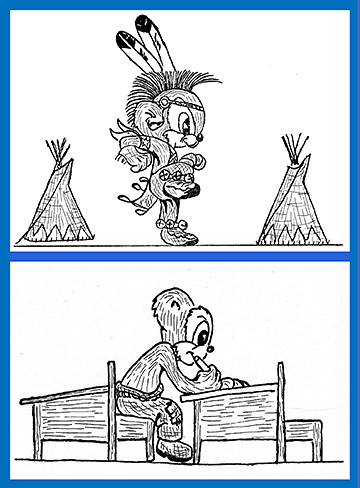An Elder-based approach to Stoney Nakoda language learning
COFFEE WITH WARREN, with Warren Harbeck
Cochrane Eagle, September 3, 2015

Traditional learning styles are honoured through modern teaching approaches in the Stoney Nakoda First Nation school system at Morley. Drawings by Jimmy Kaquitts
Summer holidays are over and the kids are heading back to school. For Stoney Nakoda First Nation students at Morley, something special is in store that should make both the smartphone generation and traditional Elders very happy.
But before I share with you one way modern classroom approaches are serving ancient learning styles in Cochrane’s neighbour to the west, let me step back to the early 1970s.
The late Jimmy Kaquitts, guitar-strumming rodeo cowboy and storyteller, was director of the Stoney Cultural Education Program back then.
He was also a really good cartoonist. He created one of the first books in his language to use the recently developed Stoney Nakoda writing system.
Mnogedu Timânîbi: Little Bear Goes on Summer Holidays, celebrated some of the old ways, such as traditional dancing, that give Stoney students so much fun when classes are out. (See my column for August 11, 2010).
But the book and the programs Jimmy directed were about more than song and dance. They pointed to a learning style that had served his people well for countless generations, a style of learning that respected the oral teachings of the Elders, a way of acquiring the knowledge and skills necessary to serve one’s community well as an adult that was grounded in careful observation and listening.
This style of learning thrived on the stories and examples of older folks who understood and practiced the time-tested values that defined Stoney Nakoda identity. The classroom for this kind of learning was the home, the community and Nature’s university.
And when the teachings required words, those words were in the spoken Stoney Nakoda language. The Elders themselves were the textbooks.
This wisdom was at the heart of a Stoney Nakoda language curriculum development meeting I attended last week at the Morley Community School as linguistic consultant.
The ten members of the committee, mostly Stoney speakers, were in agreement that this part of the school curriculum was not there to replace the Elders, but to serve them.
This could be best done, they said, not by having the school staff teach any one way of speaking Stoney in the classroom as the only way, but by equipping the students with the skills and tools that would help them learn the language and stories from family and community Elders themselves who are the true trustees and teachers of the Stoney Way.
These skills and tools would include the use of digital recording equipment as well as the Stoney writing system.
Classroom instruction in the language itself would focus on learning those words and phrases that would best enable students to interact respectfully with their true teachers of the Stoney Way outside the classroom.
Based on this approach, then, students could even produce their own written family story books and dictionaries in Stoney, as well as videos of their family’s storytellers. The role of the classroom teacher in all of this would be to guide the students in applying these family-based learning strategies.
Elder Tina Fox, a voice for wisdom on the Stoney Nakoda language curriculum committee, captured the spirit of this approach when she said: “If we lose our language, we lose ourselves.”
She supported that view with two traditional teachings: Îyethka henîcha ze gikthiyam, “Remember your Stoney roots,” and Wa’ahogipam, “Show respect.”
And that’s exactly what this Elder-based approach to the Stoney-Nakoda language curriculum is all about.
© 2015 Warren Harbeck
JoinMe@coffeewithwarren.com